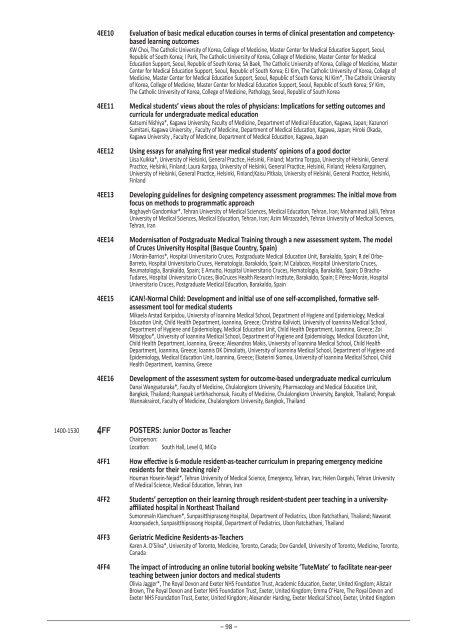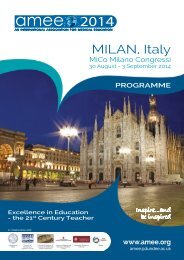AevJ1
AevJ1
AevJ1
Create successful ePaper yourself
Turn your PDF publications into a flip-book with our unique Google optimized e-Paper software.
4EE104EE114EE124EE134EE144EE154EE16Evaluation of basic medical education courses in terms of clinical presentation and competencybasedlearning outcomesKW Choi, The Catholic University of Korea, College of Medicine, Master Center for Medical Education Support, Seoul,Republic of South Korea; I Park, The Catholic University of Korea, College of Medicine, Master Center for MedicalEducation Support, Seoul, Republic of South Korea; SA Baek, The Catholic University of Korea, College of Medicine, MasterCenter for Medical Education Support, Seoul, Republic of South Korea; EJ Kim, The Catholic University of Korea, College ofMedicine, Master Center for Medical Education Support, Seoul, Republic of South Korea; NJ Kim*, The Catholic Universityof Korea, College of Medicine, Master Center for Medical Education Support, Seoul, Republic of South Korea; SY Kim,The Catholic University of Korea, College of Medicine, Pathology, Seoul, Republic of South KoreaMedical students’ views about the roles of physicians: Implications for setting outcomes andcurricula for undergraduate medical educationKatsumi Nishiya*, Kagawa University, Faculty of Medicine, Department of Medical Education, Kagawa, Japan; KazunoriSumitani, Kagawa University , Faculty of Medicine, Department of Medical Education, Kagawa, Japan; Hiroki Okada,Kagawa University , Faculty of Medicine, Department of Medical Education, Kagawa, JapanUsing essays for analyzing first year medical students’ opinions of a good doctorLiisa Kuikka*, University of Helsinki, General Practice, Helsinki, Finland; Martina Torppa, University of Helsinki, GeneralPractice, Helsinki, Finland; Laura Karppa, University of Helsinki, General Practice, Helsinki, Finland; Helena Karppinen,University of Helsinki, General Practice, Helsinki, Finland;Kaisu Pitkala, University of Helsinki, General Practice, Helsinki,FinlandDeveloping guidelines for designing competency assessment programmes: The initial move fromfocus on methods to programmatic approachRoghayeh Gandomkar*, Tehran University of Medical Sciences, Medical Education, Tehran, Iran; Mohammad Jalili, TehranUniversity of Medical Sciences, Medical Education, Tehran, Iran; Azim Mirzazadeh, Tehran University of Medical Sciences,Tehran, IranModernisation of Postgraduate Medical Training through a new assessment system. The modelof Cruces University Hospital (Basque Country, Spain)J Morán-Barrios*, Hospital Universitario Cruces, Postgraduate Medical Education Unit, Barakaldo, Spain; R del Orbe-Barreto, Hospital Universitario Cruces, Hematología, Barakaldo, Spain; M Calabozo, Hospital Universitario Cruces,Reumatología, Barakaldo, Spain; E Amutio, Hospital Universitario Cruces, Hematología, Barakaldo, Spain; D Bracho-Tudares, Hospital Universitario Cruces, BioCruces Health Research Institute, Barakaldo, Spain; E Pérez-Morán, HospitalUniversitario Cruces, Postgraduate Medical Education, Barakaldo, SpainiCAN!-Normal Child: Development and initial use of one self-accomplished, formative selfassessmenttool for medical studentsMikaela Arstad Karipidou, University of Ioannina Medical School, Department of Hygiene and Epidemiology, MedicalEducation Unit, Child Health Department, Ioannina, Greece; Christina Kalivioti, University of Ioannina Medical School,Department of Hygiene and Epidemiology, Medical Education Unit, Child Health Department, Ioannina, Greece; ZoiMitsoglou*, University of Ioannina Medical School, Department of Hygiene and Epidemiology, Medical Education Unit,Child Health Department, Ioannina, Greece; Alexandros Makis, University of Ioannina Medical School, Child HealthDepartment, Ioannina, Greece; Ioannis DK Dimoliatis, University of Ioannina Medical School, Department of Hygiene andEpidemiology, Medical Education Unit, Ioannina, Greece; Ekaterini Siomou, University of Ioannina Medical School, ChildHealth Department, Ioannina, GreeceDevelopment of the assessment system for outcome-based undergraduate medical curriculumDanai Wangsaturaka*, Faculty of Medicine, Chulalongkorn University, Pharmacology and Medical Education Unit,Bangkok, Thailand; Ruangsak Lertkhachonsuk, Faculty of Medicine, Chulalongkorn University, Bangkok, Thailand; PongsakWannakrairot, Faculty of Medicine, Chulalongkorn University, Bangkok, Thailand1400-1530 4FF POSTERS: Junior Doctor as TeacherChairperson:Location: South Hall, Level 0, MiCo4FF14FF24FF34FF4How effective is 6-module resident-as-teacher curriculum in preparing emergency medicineresidents for their teaching role?Houman Hosein-Nejad*, Tehran University of Medical Science, Emergency, Tehran, Iran; Helen Dargahi, Tehran Universityof Medical Science, Medical Education, Tehran, IranStudents’ perception on their learning through resident-student peer teaching in a universityaffiliatedhospital in Northeast ThailandSumonmaln Klamchuen*, Sunpasitthiprasong Hospital, Department of Pediatrics, Ubon Ratchathani, Thailand; NawaratAroonyadech, Sunpasitthiprasong Hospital, Department of Pediatrics, Ubon Ratchathani, ThailandGeriatric Medicine Residents-as-TeachersKaren A. D’Silva*, University of Toronto, Medicine, Toronto, Canada; Dov Gandell, University of Toronto, Medicine, Toronto,CanadaThe impact of introducing an online tutorial booking website ‘TuteMate’ to facilitate near-peerteaching between junior doctors and medical studentsOlivia Jagger*, The Royal Devon and Exeter NHS Foundation Trust, Academic Education, Exeter, United Kingdom; AlistairBrown, The Royal Devon and Exeter NHS Foundation Trust, Exeter, United Kingdom; Emma O’Hare, The Royal Devon andExeter NHS Foundation Trust, Exeter, United Kingdom; Alexander Harding, Exeter Medical School, Exeter, United Kingdom– 98 –



